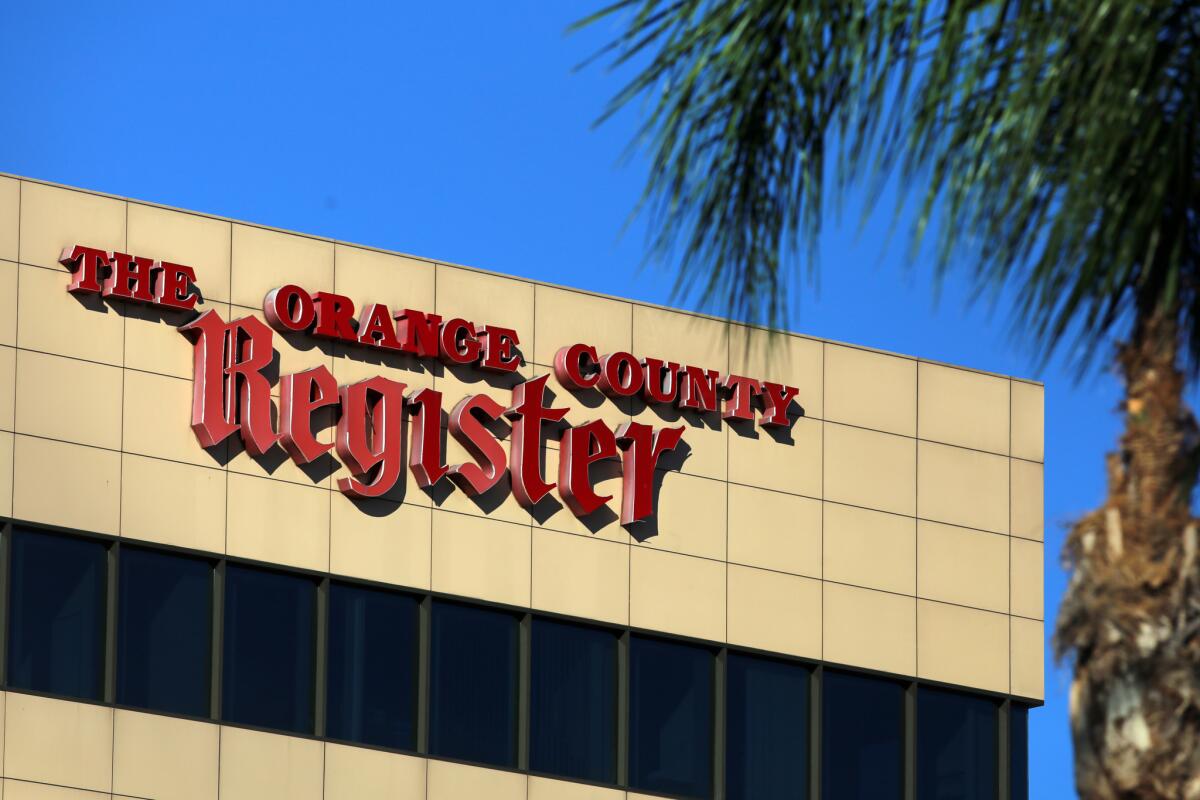U.S. files suit to block Tribune purchase of O.C. Register parent

The Orange County Register building in Santa Ana. The paper’s parent, Freedom Communications, will be sold to Digital First Media.
- Share via
The owner of the Los Angeles Times was selected as the top bidder for the Orange County Register and Riverside Press-Enterprise during the papers’ bankruptcy auction, but the U.S. Department of Justice immediately filed a lawsuit to block the deal Thursday on antitrust grounds.
The government sought a temporary restraining order within hours of the announcement that Tribune Publishing’s $56-million bid for bankrupt Freedom Communications had topped a competing offer from the owner of the Los Angeles Daily News.
“If this acquisition is allowed to proceed, newspaper competition will be eliminated and readers and advertisers in Orange and Riverside counties will suffer,” Assistant Atty. Gen. Bill Baer of the Justice Department’s Antitrust Division said in a statement.
Tribune Publishing has vowed to defend the legality of the sale.
“The Division is living in a time capsule, with a framework that predates the arrival of iPhones, Google, Facebook, and modern media outlets that are killing the traditional newspaper industry,” spokeswoman Dana Meyer said in a statement. “It wasn’t competition from the L.A. Times that forced the Register into bankruptcy. It was the Internet and related technology.”
The Justice Department had warned earlier in the week that it would intervene if Tribune Publishing won Freedom’s assets.
The government said it did not have concerns with competing bids from Daily News owner Digital First Media or a group of Freedom insiders.
The move complicates a hearing scheduled Monday in Santa Ana before U.S. Bankruptcy Court Judge Mark Wallace, who must approve Tribune’s bid for the sale to go through. The Santa Ana newspaper publishing company filed for Chapter 11 bankruptcy protection in November.
Robert K. Rasmussen, a bankruptcy expert at the USC Gould School of Law, said the judge will probably want to see if antitrust issues can be resolved relatively quickly, perhaps in a settlement, to help Freedom pay back its creditors.
The government argued the deal would allow Tribune to control 98% of the sales for English-language local daily newspapers in Orange County. And in Riverside County, Tribune would own four of the top five English-language newspapers by circulation.
George S. Georgiev, a business law professor at the UCLA School of Law, said the Justice Department’s lawsuit indicates it believes it has a strong case.
“DOJ doesn’t like to lose,” he said. “I think they have thought pretty carefully about this and they really believe they can prevail or at least extract significant concessions,” he said, such as agreeing to certain operating restrictions or selling off some assets.
Tribune is looking to extend its reach in Southern California and save money by streamlining some business operations at a time when newspapers struggle to remain profitable.
If the sale is finalized, the company would own four major daily newspapers in Southern California. It acquired the San Diego Union-Tribune and related properties last year for $85 million.
“The successful bid for the business of Freedom Communications will allow the Orange County Register and the Press-Enterprise to continue providing a distinct local voice in their communities and deliver premium news and information to consumers across Southern California,” Tribune Publishing Chief Executive Justin Dearborn said in a statement.
Some media and antitrust experts supported the Tribune’s stance.
Gabriel Kahn, co-director of the Media, Economics and Entrepreneurship program at USC’s Annenberg School for Communication and Journalism, said the federal government’s concerns were “from a different era.”
He noted that consumers and advertisers have many more options than decades ago and added that it’s prudent for struggling newspapers to share costs.
“I think local democracy is most ill served by blocking any efforts these publications have to achieve scale, to combine resources. Because the consequences of that are the businesses continue to diminish and that means the ability to afford strong local reporting is diminished as well,” he said.
Daniel Lazaroff, professor emeritus at Loyola Law School, said an expanded Tribune Publishing still wouldn’t be able to dictate rates for advertisers, given the many online options, including websites, search engines and social media.
“If they raise advertising rates significantly they would lose even more advertising,” he said. “It’s like saying Italian suits are a separate market from all suits.”
Still, the government’s action, which will be heard in U.S. District Court, opens the possibility that another bidder could end up with the papers. Bankruptcy Court Judge Wallace could determine that antitrust scrutiny could tie up a sale for months or years — and decide to move on to another bidder.
andrew.khouri@latimes.com
Twitter: @khouriandrew
More to Read
Inside the business of entertainment
The Wide Shot brings you news, analysis and insights on everything from streaming wars to production — and what it all means for the future.
You may occasionally receive promotional content from the Los Angeles Times.











